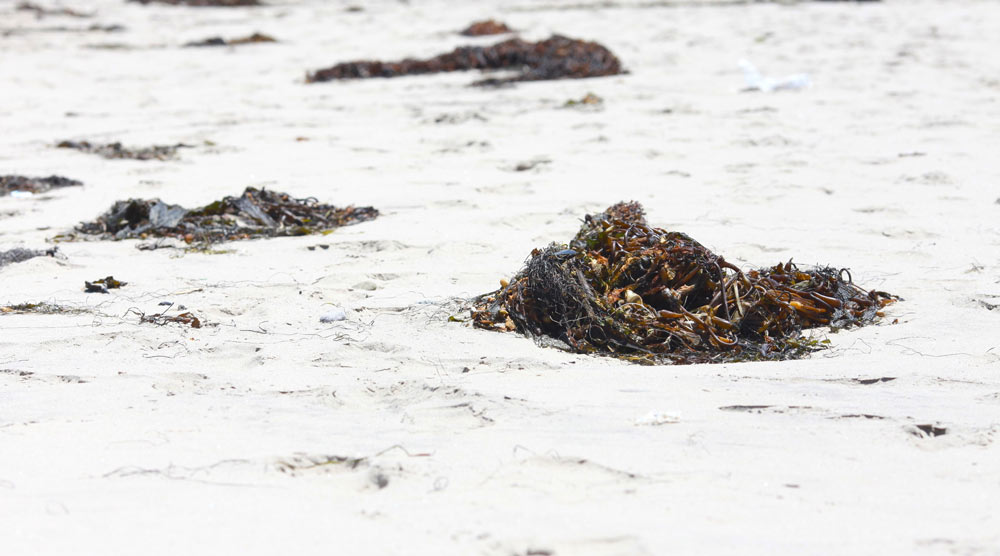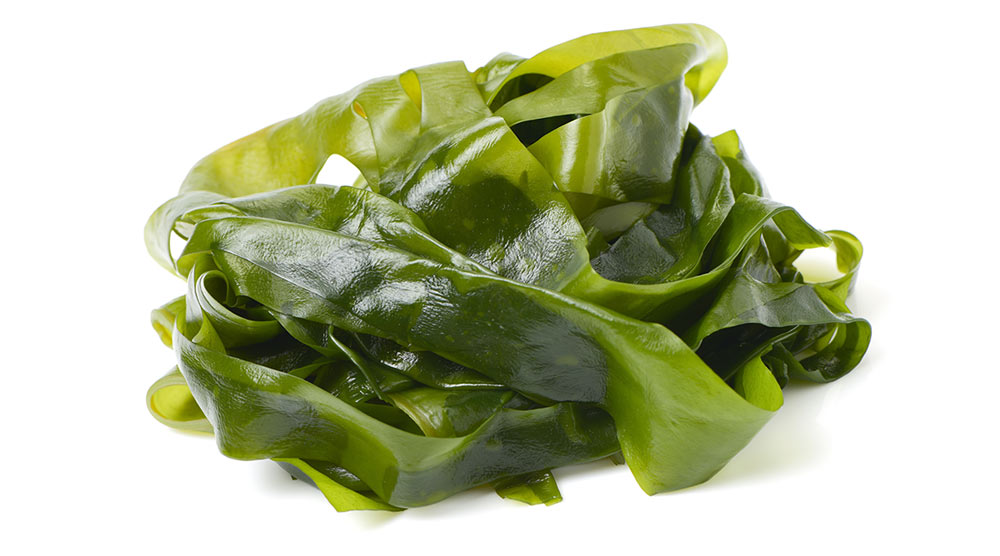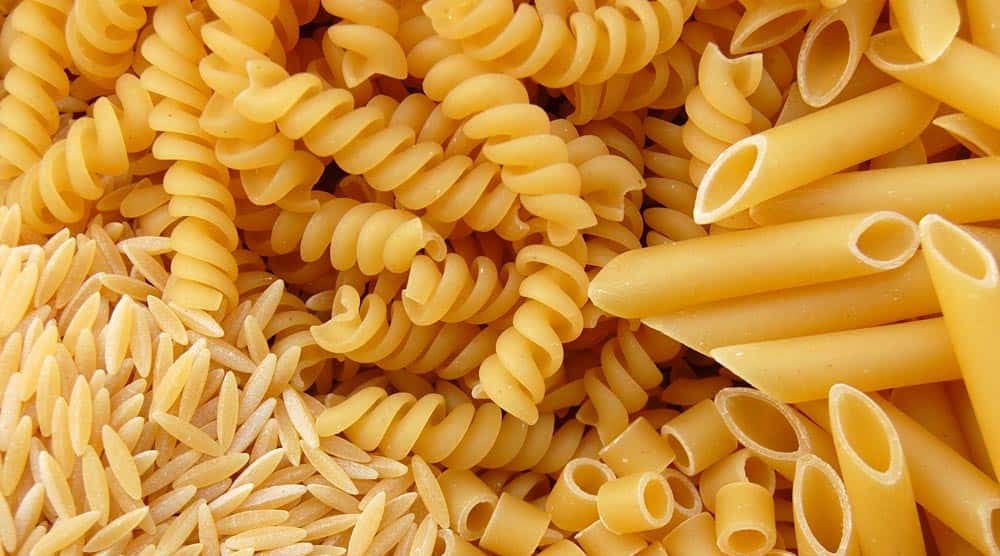Seaweed is a popular human supplement, mainly because it contains nutrients such as omega-3, magnesium and iron. Healthy human food isn’t always good for canine companions though – so can dogs eat seaweed? And is it safe for them to eat any type of seaweed? Keep reading to find out.

The Quick Answer
Dogs can eat seaweed as long as it isn’t dried wild seaweed. Seaweed can be beneficial – at least in moderation- as it contains a range of important nutrients.
Dried wild seaweed (such as found on beaches in the summer), however, can be extremely dangerous as it expands once inside your dog’s stomach. This can cause serious and rapid health problems and may even result in death if not caught early. For this reason, if you suspect your dog has eaten dried seaweed you should contact your vet immediately.
Contents
Are Any Plant-Based Foods Good for Dogs?
Before we get to whether seaweed is good for dogs, we need to briefly address the meat vs. plant debate.
If you’ve spent any time on dog blogs or websites, you’ve probably come across the concept of feeding dogs “natural foods.” The idea is that wolves are carnivores, so domestic dogs should thrive on a meat-only diet (at least according to proponents of this type of diet).
For most dog owners, however, there is no need to avoid plant-based foods – and there certainly isn’t anything wrong with feeding your dog a mixture of meat and plants. In fact, fruits and vegetables, such as a handful of blueberries, can be a nutritious snack.
So Why is There so Much Debate About Plant Foods?
Despite dogs being able to thrive on a mixed diet, there is still a fierce debate over whether dogs are carnivores (meat-only) or omnivores (both meat and plants).
This is partly confusion – some people mix up the taxonomic description of an animal with feeding behaviour. Dogs, like cats, are classified as Carnivora. These animals all can eat meat, but it doesn’t mean they only eat meat.
Cats, for example, are true carnivores – they need meat to survive. Bears are part of the same taxonomic classification, but are known to eat both animal and plant foods. Just because domestic dogs are labelled as Carnivora doesn’t mean they are true carnivores.
Moving away from taxonomy, true carnivores cannot survive on a diet that doesn’t include meat. This is because certain nutrients, such as Vitamin A, are only found in a digestible form for these animals in meat products.
Dogs are Not True Carnivores
The label “true carnivore” clearly doesn’t apply to dogs though. Going back up the evolutionary chain, wolves hunt and eat whatever prey is available. While eating prey, they consume the stomach and intestines which contain plant matter. Wolves also eat mushrooms, berries and fruits when necessary.
Similarly, domestic dogs are able to obtain vital nutrients from a wider range of foods than true carnivores such as cats. Whether they happen to be eating raw chicken or berries, dogs are great at digesting a variety of foods. They can get nutrients such as Vitamin A from plant sources too.
An argument against dogs being omnivores is that they have shorter small intestines than species such as humans. Plants are more difficult to digest, so this suggests they are less adapted to plant foods. While this is true, dogs also have a longer small intestine than true carnivores, which is why many people still think they should be nutritionally classified as omnivores.
In my opinion, a better question is “can dogs thrive on an omnivorous diet?” Considering both wolves and dogs are adapted to scavenging and a varied diet, the answer appears to be “yes.” While it’s admirable to want to feed dogs a “natural” diet, in reality a dog’s natural diet would consist of scavenging whatever food he could find – not just relying on pure meat.
“I find it is often very dedicated owners who explore a more ‘natural’ diet and consider home cooking or raw feeding,” adds vet Dr Linda Simon. “However, I’d always advise they consult a canine nutritionist, to ensure their dietary needs are met and they do not develop any deficiencies.”
So with that slight tangent out of the way, let’s get back to the main topic…
Is Seaweed Good or Bad for Dogs?
The good news is that dogs can eat seaweed without getting ill – at least in moderation. But is seaweed actually good for your dog?
Seaweed is a surprisingly nutritionally-dense food. According to Healthline, it’s a nutritious food that contains nutrients such as:
- Magnesium
- Selenium
- Iodine
- Calcium
- Potassium
- Iron
- B vitamins (some types of seaweed)
- Omega-3 fatty acids
Many of these nutrients are just as important for dogs as they are for humans. The exact amount of each nutrient varies depending on the type of seaweed, but eating small portions of seaweed may help give your dog a healthy, glossy coat.
In particular, Nori seaweed is a source of vitamin B12. Omega-3 fatty acids, which are found in some types of seaweed, may improve joint health.
It’s worth noting that too much iodine can affect the thyroid gland. While seaweed contains a relatively high amount of iodine, a dog would need to eat a lot for this to become an issue though.
How Much Seaweed Can Dogs Eat?
Just because dogs can eat seaweed doesn’t mean they should eat a lot of it. Nutrient supplements should be used sparingly, as certain types of seaweed can contain poisonous substances such as arsenic and mercury. If you’re not sure how much to give your dog, make sure you ask your vet first.
When introducing any new food into your dog’s diet, you should always do so slowly and cautiously. It’s also a good idea to add new food types one at a time. Monitor your dog’s stool, appearance, behaviour and energy levels, and stop giving it to your dog if you think it’s causing an issue.
Can Dogs Eat Wild or Dried Seaweed?

Seaweed itself isn’t dangerous when taken in supplement form – but it can be very dangerous to dogs when dried.
When seaweed is washed up on the beach during summer, the burning sun can quickly dry it. As it loses moisture the seaweed shrinks to a fraction of its previous size.
Unfortunately, if your pup eats the seaweed it is likely to expand as it absorbs fluid in the stomach and intestine. This causes blockages that can be potentially fatal if not caught early.
For this reason, be aware of any dried seaweed when walking your dog on the beach. If he goes near it, quickly pull him away. This applies to any type of seaweed, including mayweed, kelp and sea oak.
“The beach can be a dangerous place for our pooch, with risks including sand impactions, seawater toxicity, jellyfish stings and seaweed ingestion,” adds Dr Linda Simon. “As not all owners are aware of the risks of seaweed, I find they do not always know they should stop their dog tasting and chewing it.”
If you suspect your dog ate some dried seaweed, contact your vet immediately, as his condition could rapidly get worse. It may only take a few hours to go from perfectly healthy to close to death, so watch out for symptoms such as vomiting, diarrhoea and appetite loss. Treatment may involve induced vomiting, IV fluids, and other supportive care.
Summary
In most cases, it is safe for dogs to eat seaweed. In fact, many types of seaweed are nutritionally dense, so in small amounts they may help improve your dog’s coat, joint health and cognitive function.
Wild dried seaweed found on beaches, however, is dangerous for your dog to eat. Seaweed shrinks as it dries, but will expand in your dog’s stomach once eaten. This can lead to a potentially fatal blockage. For this reason, never let your dog eat seaweed on the beach.





Seaweed actually has a lot of nutritional benefits for your doggy friends.
1. Kelp is a form of seaweed famous for restorative properties which help with your doggy’s skin as well as tissue repair and helps your dog get a glossy and healthy coat
2. Nori–another type of seaweed– has high amounts of vitamin B12 which help improve your doggy’s cognitive functions
So I think Dogs can eat seaweed.